Top 7 Mindbody alternatives & competitors
Explore the Top 7 Mindbody Alternatives for wellness and fitness management. Compare features, pricing, and user experiences to find the best solution tailored to your business needs.
If you're a fitness studio owner or manager, you might have heard of Mindbody—a big name that’s often the go-to solution for many in the industry. It's packed with features that promise to simplify your day-to-day operations and enhance client interactions.
But let’s be honest, one size doesn’t always fit all, and Mindbody pricing and complex features might not mesh with every fitness business’s needs.
That's where exploring alternatives comes into play. Whether it's the cost, specific functionalities, or just a desire for a simpler user interface, there are plenty of reasons you might be scanning the horizon for something different.
And you’re not alone! Many are on the lookout for fitness management software that feels tailor-made for their unique challenges—something that feels less like wrestling with a complicated system and more like having a silent partner that just gets you.
So, if you're curious about what’s beyond the well-trodden path of Mindbody, or if you're starting to feel that your current software doesn't quite gel with the way you do things, stick with us.
We’ll search Mindbody alternatives to help you find a solution that not only fits your business like a glove but also supports your growth without breaking the bank. Let’s find the perfect match for your fitness studio’s needs!
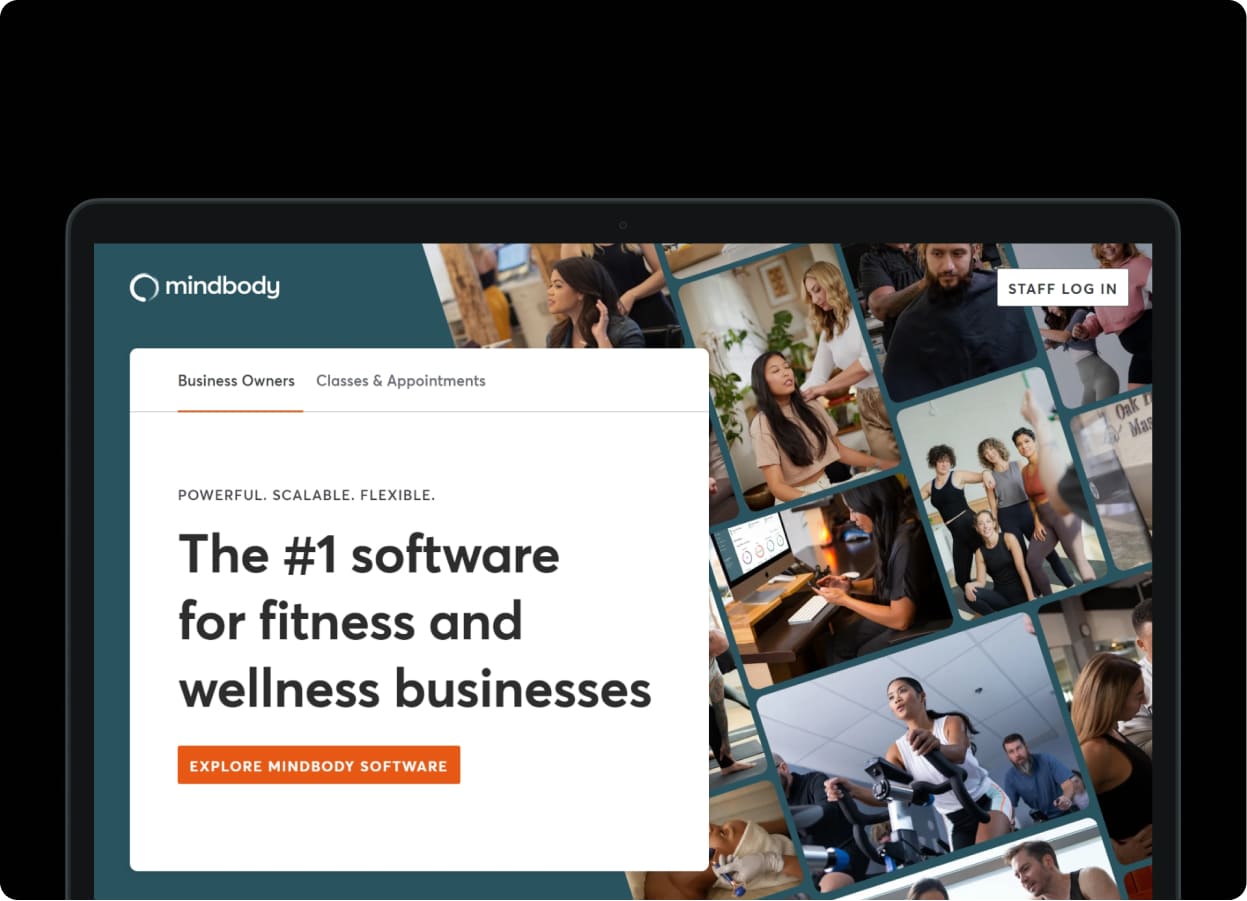
Source: Mindbody
Mindbody overview
Mindbody has been a major player in the fitness and wellness software industry since its transformation from Hardbody Software in 2001. Known for its comprehensive features, Mindbody offers client management, booking capabilities, and an expansive marketing toolkit
Mindbody is often praised for its wide array of features, which include everything from client management and booking to comprehensive marketing tools. One of its standout features is the Mindbody Explore Marketplace, designed to help businesses increase their visibility and attract new clients.
However, as Paul pointed out in his one-star review on softwareadvice.com.au, this very feature might also expose your business to competitors, potentially diverting prospective clients to other local offerings.
Pricing and accessibility
Mindbody’s pricing starts at $179 per month, with no free trial available. This pricing structure can be a barrier for potential users who prefer to test software before committing financially, making it less accessible compared to some more budget-friendly alternatives
User experience and complexity
User reviews have highlighted a few pain points, particularly concerning its complexity and user interface. New users might find the platform overwhelming, which could lead to frustration and a steep learning curve.
While Mindbody offers robust functionalities, the intricacies of its system could be a deterrent for smaller businesses or those with straightforward needs
Competition and comparisons
Mindbody faces stiff competition from platforms like Glofox and Vagaro. Customers evaluating Mindbody often compare its features and pricing against these competitors, particularly in direct comparisons like Glofox vs Mindbody and Mindbody vs Vagaro, to determine which service might better meet their specific needs.
Conclusion on suitability
While Mindbody has a strong market presence with features like integrated payments and an extensive marketing suite, it may not be the ideal solution for everyone. Businesses prioritising ease of use, affordability, and customer service might find better alternatives that do not compromise on essential functionalities.
For those looking for a platform that balances functionality with user-friendliness and cost-effectiveness, exploring alternatives could lead to finding a better fit for specific business needs.

Source: Pexels
Reasons to consider alternatives
When it comes to selecting the right fitness studio management software, there’s no denying that Mindbody has been a front-runner. However, the fit isn't always perfect for everyone. Here are several compelling reasons why exploring alternatives to Mindbody might just be the strategic move your business needs:
1. Cost efficiency
Mindbody's pricing can be a significant factor, especially for small to mid-sized businesses. The platform is known for its high monthly costs, which can escalate quickly if you wish to access its more advanced features. Alternatives might offer more cost-effective solutions without the hefty price tag, providing similar features at a more manageable cost.
2. User interface and experience
Mindbody's interface has often been described as clunky and outdated, which can complicate routine tasks like booking and client management. Newer competitors may offer more modern, user-friendly interfaces that simplify operations and improve user experience.
3. Customer support
Effective support is crucial for resolving issues quickly and ensuring smooth operations. Mindbody has received mixed reviews regarding the responsiveness and helpfulness of its support team. Alternatives might provide more reliable or accessible customer service, which can be a deciding factor for businesses that prioritise ongoing support.
4. Inclusion of features in base price
Some alternatives to Mindbody include features like mobile apps and client engagement tools in their base price, without requiring additional fees. This integrated approach can provide better value and predictability in expenses, which is particularly appealing to businesses looking to maximise functionality while keeping costs down.
5. Flexibility and scalability
Depending on your business size and growth trajectory, Mindbody’s structure may not be the most scalable or flexible option. Competitors might offer more tailored solutions that can better adapt to the changing needs of your business, from solo practitioners to large studios.
Top 5 Mindbody alternatives
From pricing transparency to customizability and user experience, we're about to dive into a world of options that could be the perfect match for your fitness business needs. Let's find your ideal fitness software companion!
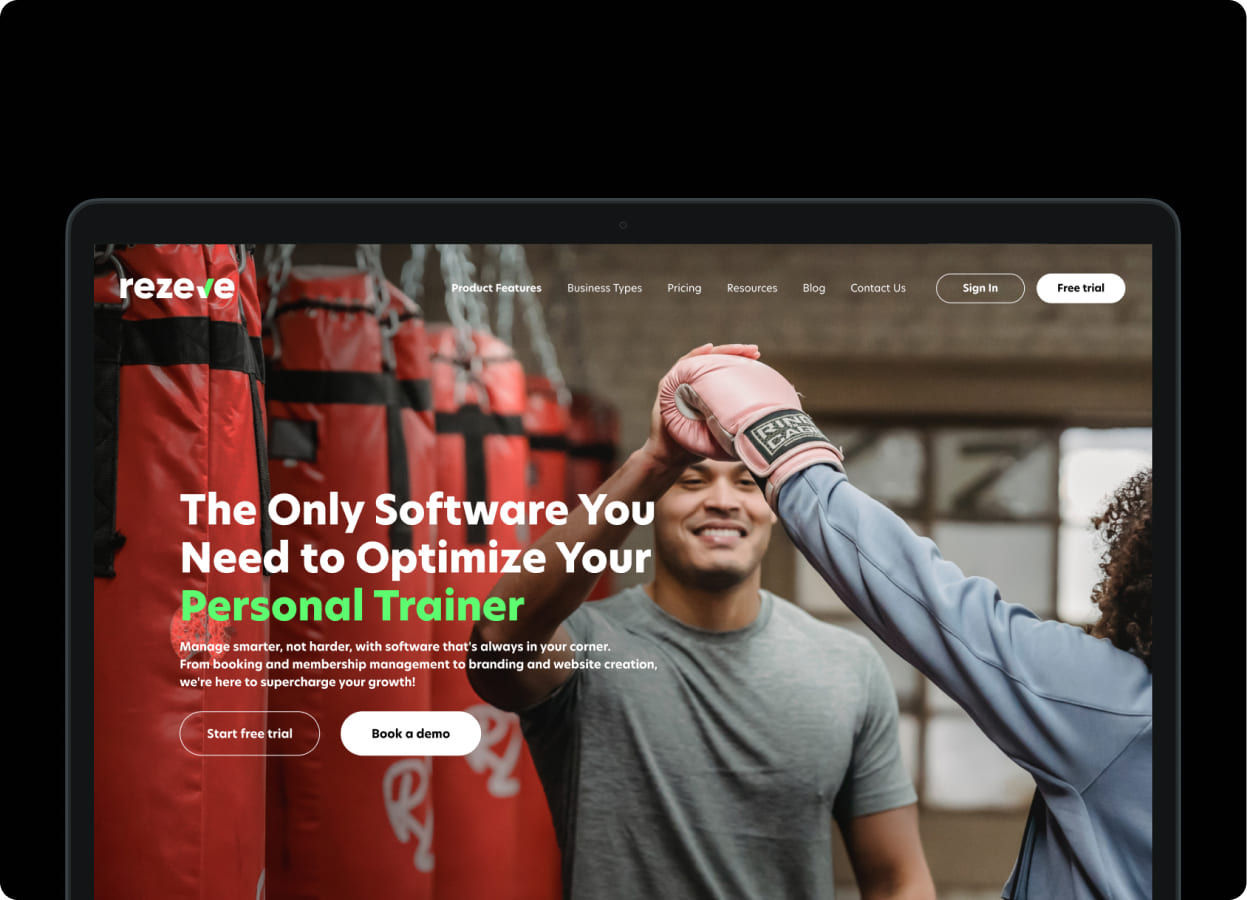
Source: Rezerv
1. Rezerv
First up on our list is Rezerv, a versatile tool that breaks the mould of traditional fitness studio software.
Far from being confined to fitness studios alone, Rezerv caters to a wide array of service-based businesses, making it an ideal choice for everyone from independent personal trainers to large-scale fitness centres.
Feature-rich and user-centric: Rezerv shines with its extensive feature set. It's equipped with a custom-branded website builder, efficient booking management, and thorough staff and membership management systems. The inclusion of robust marketing tools further enhances its appeal. Rezerv acts like an extension of your team, focusing on the seamless management of various business aspects.
Innovative shareable package: A standout feature is the Shareable Package, which revolutionises how session bundles are utilised. Members can purchase and share sessions with friends or family, fostering client referrals and aiding in business expansion. This feature is particularly beneficial for studios looking to broaden their clientele.
Unique offerings – Spot Booking and Family Accounts: Spot Booking addresses the needs of studios with high demand for specific equipment or spaces, like spin or Pilates classes. This feature allows clients to book their preferred spot or equipment in advance, significantly enhancing their class experience.

Source: Pexels
The Family Account feature, ideal for studios with kids' classes, simplifies the booking process for parents by letting them manage their children's bookings under a single account. It's a thoughtful addition that caters to family-oriented services.
Unwavering client support: Rezerv sets itself apart with its unwavering commitment to client support. Understanding the complexities of booking management software, they offer unlimited help to ensure clients can fully utilise the software's features.
This level of support is invaluable for businesses adapting to a new system or looking to maximise the software's potential.
Reviews from Software Advice reinforce this, stating that the Rezerv team is "prompt with responding and dedicated to solving problems and coming up with features that's helpful for end users”. Another review notes the team’s readiness to incorporate feedback and improve the platform, indicating a customer-driven approach.
User experience: Customers have praised Rezerv for its ease of use and intuitive interface. One review on Capterra highlights that Rezerv has been a "fantastic experience" for studio management needs, emphasising its user-friendliness and the minimal need for complex training. This ease of use is crucial for businesses seeking a straightforward, efficient tool for managing their operations.
Pros:
- Integrated custom-branded website builders that are user-friendly and require no coding skills to use. Plus, there are 50+ website templates to choose from.
- Unique features for managing family subscriptions, group booking, spot booking, and shareable package.
- Support online local payment methods such as virtual account, QRIS, bank transfer, e-wallet, and credit card.
- Unlimited support policy for businesses.
- Offers a budget-friendly price, making it especially suitable for small or boutique fitness studios.
- Comes integrated with ClassPass, allowing fitness business owners to reach a broader customer base.
Cons:
- No free plan
Notable features:
- Branded website builder: Enable business owners to build their own custom branded website in a snap. No coding required!
- Spot Booking: Allow customers to reserve their desired spot or equipment before the class starts.
- Group Booking: Allow customers to book classes and sessions together with their friends or family, rather than each person making separate bookings.
- Shareable Package: Allows customers to purchase a package of credits and share them with their friends and family.
- Family Account: Allow customers (parent) to book classes for their children.
Free Trial:
1-month free trial period
Pricing:
The standard plans are:
- Starter at 29.90 USD/month
- Team at 169.90 USD/location/month
- Business at 299.90 USD/location/month
- Enterprise: Contact for pricing
It's important to note that pricing can vary based on your location, so it’s a good idea to check this page for the rates specific to your country.
And here's a sweet deal – if you're all in for the long haul, opting for an annual plan snags you a 20% discount. It's Rezerv's way of saying thanks for your commitment, making the start of this partnership even more rewarding.
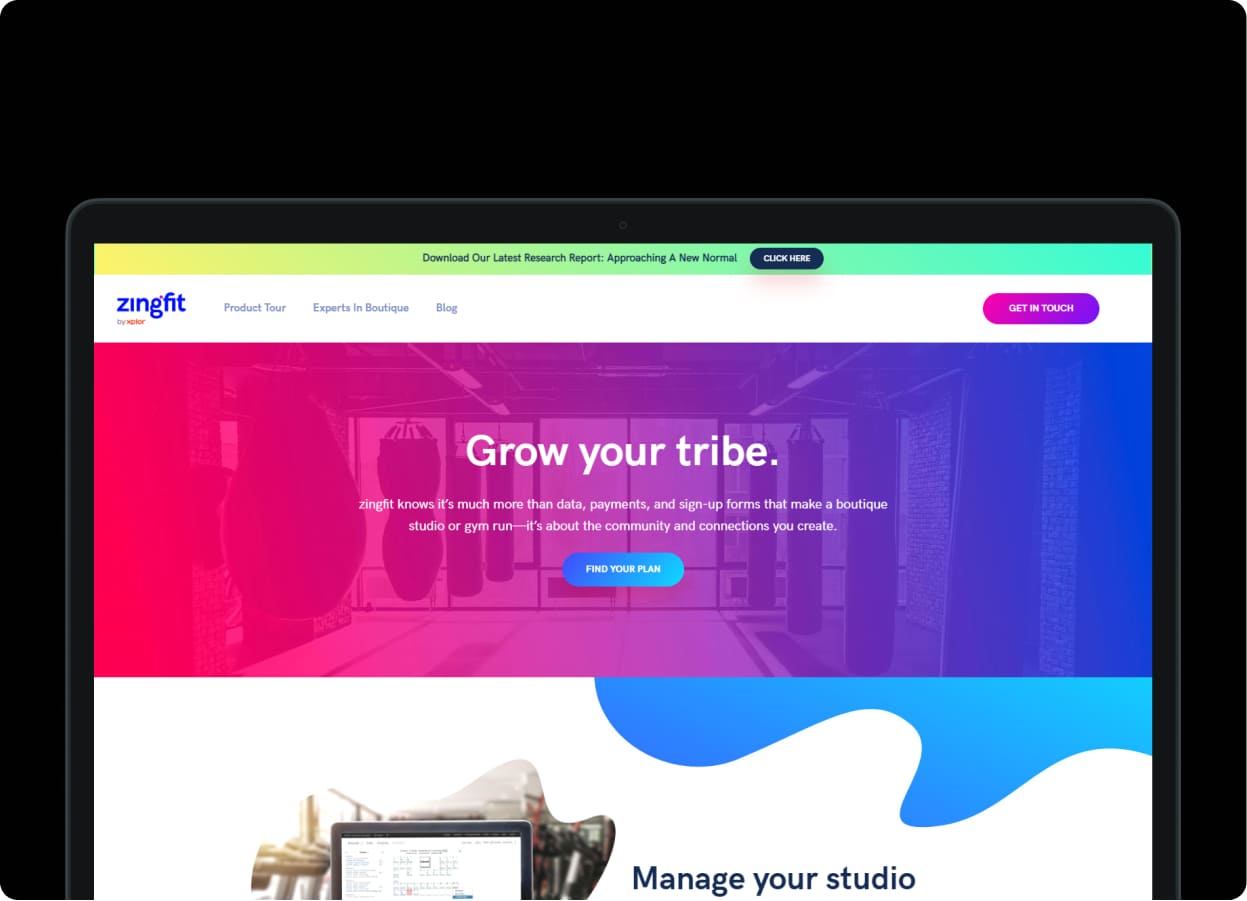
Source: ZingFit
2. ZingFit
Launched on August 17, 2012, ZingFit has been a familiar name in the fitness software realm, especially for studios looking for integrated solutions. But as we all know, familiarity doesn't always equate to superiority. Let's take a closer look at what ZingFit offers and, more importantly, where it might fall short for some users.
Pricing and plans: ZingFit presents three main pricing plans: Studio Plan at $149/month, Boutique Plan at $299/month, and the Enterprise Plan at $459/month. The tiered pricing structure suggests flexibility, but one can't help but wonder if the higher tiers are just a hefty price tag for a marginal increase in features.
Integration with website: ZingFit boasts about its iframe integration, allowing seamless scheduling and e-commerce directly on studio websites. This feature removes the need for third-party hosted pages, which is a plus. However, is this level of integration a unique offering, or just a standard expectation in today's digital age?
API and customization: The ZingFit API is available for Elite and enterprise clients, offering a degree of customization for digital experiences. But here's the catch – it's not for everyone. Only those at the higher end of the pricing spectrum get to fully leverage this feature. [1]
Customer service: User reviews often highlight ZingFit's responsive customer service team. However, there are mixed feelings about the software's functionality and occasional glitches. Some users have expressed frustration over changes in payment gateway processors, resulting in lost customer card information. [2]
Trial and transaction fees: Details about ZingFit's trial offers and transaction fees are not readily transparent, which might leave potential users guessing. In an industry where clarity and upfront information are key, this lack of transparency could be a turn-off.
Market focus: It's important to note that ZingFit appears to primarily focus on the U.S. market. This focus may limit its availability and support in other regions such as Asia, Europe, and other international markets. Users outside the U.S. may not receive the same level of attention and customization.
While ZingFit has its strengths, particularly in website integration and customer service, it's not without its limitations. The tiered pricing and API availability primarily benefit larger studios, potentially leaving smaller businesses feeling left out. [3]
Furthermore, the lack of clear information on trial offers and transaction fees raises questions about overall transparency. Additionally, ZingFit's focus on the U.S. market may limit its appeal to businesses in other regions.
Pros:
- Strong website integration capabilities.
- High level of customization for elite and enterprise users.
- Generally positive feedback on customer support responsiveness.
Cons:
- Pricing information is not straightforwardly available.
- Mobile app experience is considered subpar by some users.
- Limited access to advanced features for lower-tier plans.
Notable features:
- Class Management: Streamlines the scheduling and management of fitness classes.
- Online Booking and Payments: Enhances customer experience by simplifying the booking and payment processes.
- Marketing Tools: Supports integration with digital marketing tools such as Google Analytics and Facebook Pixel, aiding studios in targeted advertising and analysis.
Free trial:
Currently, there is no clear information regarding a free trial offer for ZingFit, which might affect the decision-making process for potential users.
Pricing:
As noted, detailed pricing is best obtained through direct inquiry, with known figures suggesting several tiered options depending on the studio's size and needs:
- Studio Plan: $149 per month
- Boutique Plan: $299 per month
- Enterprise Plan: $459 per month
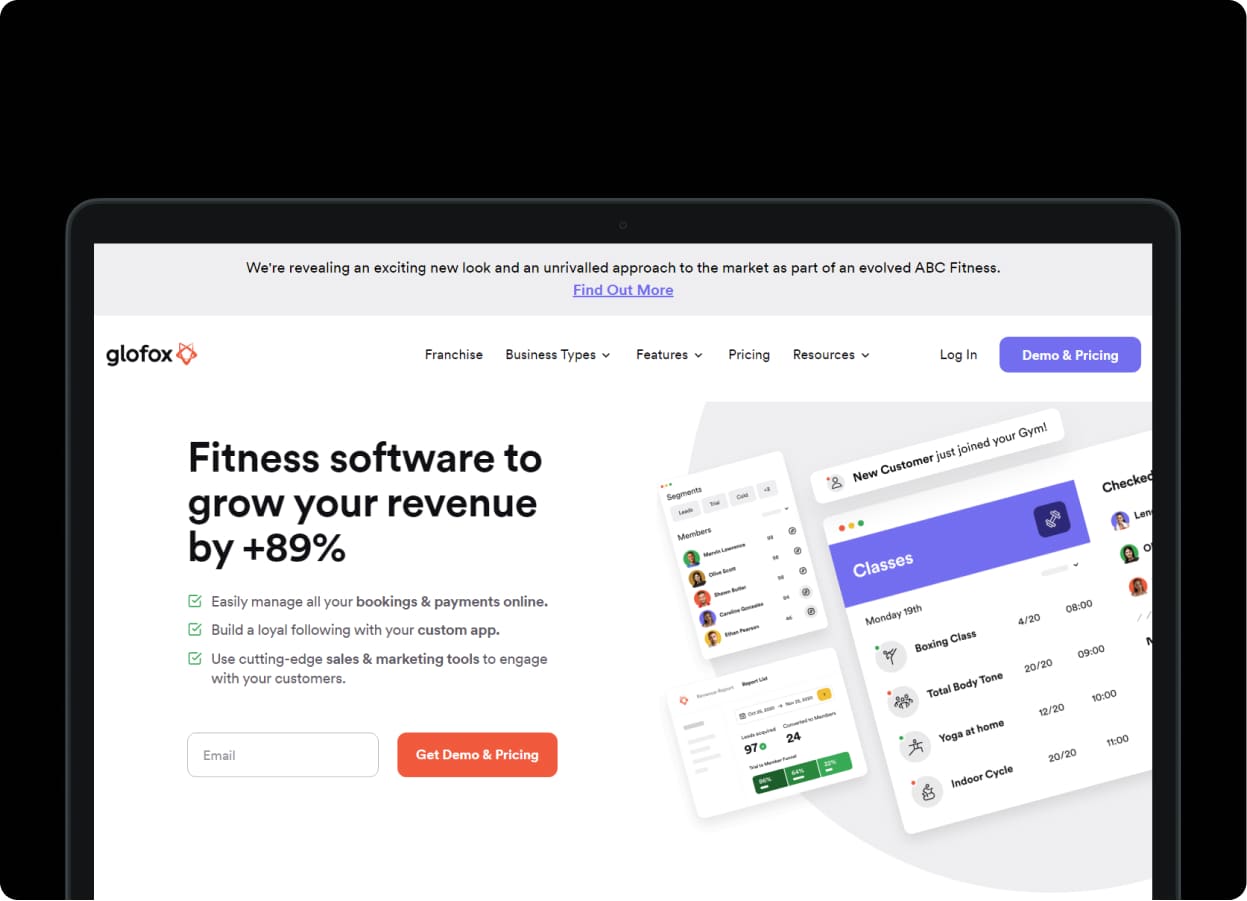
Source: Glofox
3. Glofox
Established in 2014, Glofox is a Dublin-based fitness club management startup. It's known for its ease of use and strong customer support. This makes Glofox particularly appealing to smaller fitness studios and businesses just starting out.
Customised experience, but with limitations: Glofox distinguishes itself with a custom-branded mobile app for each client, which enhances brand loyalty and member engagement.
This app allows for easy class registrations, payments, and even retail purchases. However, Glofox's reliance on Stripe as its payment processor limits its operation to Stripe-supported countries and lacks direct debit integration. Also, the absence of coupon and discount code functionality might restrict promotional strategies for businesses.
Operational challenges: Despite its user-friendly interface, Glofox has faced criticism for operational issues. Features like 'Book a Buddy' have been reported as ineffective, and integration glitches have led to lost bookings, which is a serious concern for any business relying on the software for scheduling and client management. [4]
Communication and support features: Glofox's mobile admin app is a notable addition, allowing clients to manage their business directly from their phone. However, users have reported limitations in communicating class changes or cancellations through the app, which could lead to customer dissatisfaction and management difficulties. [4] [5]
Glofox, with its focus on customization and ease of use, offers certain advantages for fitness businesses, especially smaller ones or those just starting.
However, its limitations in payment integration, operational reliability, and communication could make it less suitable for businesses that require robust, flexible, and reliable management software.
Pros:
- User-friendly interface.
- Integrated custom-branded Android & iOS apps.
- Integrated CRM system.
Cons:
- Take a fee on top of the provider's fee.
- The pricing information is not readily available.
- Can be relatively expensive compared to others.
Notable features:
- Automated Emails and Push Notifications: Set up triggers that will automatically send emails or notifications.
- Membership Management: Create, customise and manage membership plans.
Free Trial:
No free trial
Pricing:
Customised pricing, start from USD 100/month.

Source: TeamUp
4. TeamUp
Esteemed for its wide application across various fitness-focused entities such as gyms, personal trainers, and CrossFit gym, TeamUp has established itself as a versatile solution in the fitness industry.
It's designed to simplify the management of class schedules, customer relationships, and payments, aiming to streamline fitness business operations. But, does its functionality align seamlessly with all business needs?
Comprehensive features, but are they user-friendly? TeamUp's rich feature set includes customer management, class scheduling, memberships, payment processing, integrations, and reporting. While these features are built to cater to a wide range of fitness business needs, their user-friendliness is a crucial factor.
The ease of setting up and using these features is paramount, especially for less tech-savvy users. The software's customer tools and integrations with various platforms add to its appeal, but the complexity in setting these up can be a deterrent for some. [6]
Pricing that grows with you - but at what scale? TeamUp's pricing model, based on the number of active customers, starts at $99/month for up to 100 active customers and scales up to $309/month for 601+ active customers.
While this flexible pricing is advantageous as it grows with the business, it raises questions about affordability for larger operations. Small businesses might find the entry-level pricing reasonable, but as they expand, the increasing costs could become a concern. [7]
Usability and accessibility - A mixed bag: Users have praised TeamUp for its ease of setup and quality customer support. However, challenges in the setup of integrations and the subpar performance of its mobile apps have been noted.
These aspects could impact the overall user experience, particularly for those who rely heavily on mobile platforms and seamless integrations for their business operations. [8]
TeamUp offers a broad array of features tailored for fitness businesses, with a strong emphasis on customer and staff tools, as well as integrations. However, its potential complexity in setup, especially for non-tech-savvy users, and the limitations of its mobile app might not make it the best fit for all.
Pros:
- Pricing structure is based on the number of members and does not offer tiered pricing. This means that all features are available to users regardless of the pricing plan they choose.
- Offers dedicated branded mobile apps.
Cons:
- Email campaigns require outside integration with an email tool like Mailchimp.
- No free plan
Notable features:
- Access Security Control: Ensures that only registered and enrolled members can access the gym's facilities.
- Family and Group Account: Let customers create a shared account for their family or friends. This allows them to add family members or friends as members of their account, making it easier to manage schedules, track payments, and take advantage of group discounts.
Free Trial:
1-month free trial period
Pricing:
Depends how many active customers you have per month:
- 99 USD per month for 0-100 clients.
- 159 USD per month for 101-200 clients.
- 189 USD per month for 201-300 clients.
- 219 USD per month for 301-400 clients.
- 249 USD per month for 401-500 clients.
- 279 USD per month for 501-600 clients.
- 309 USD per month for 600+ clients.
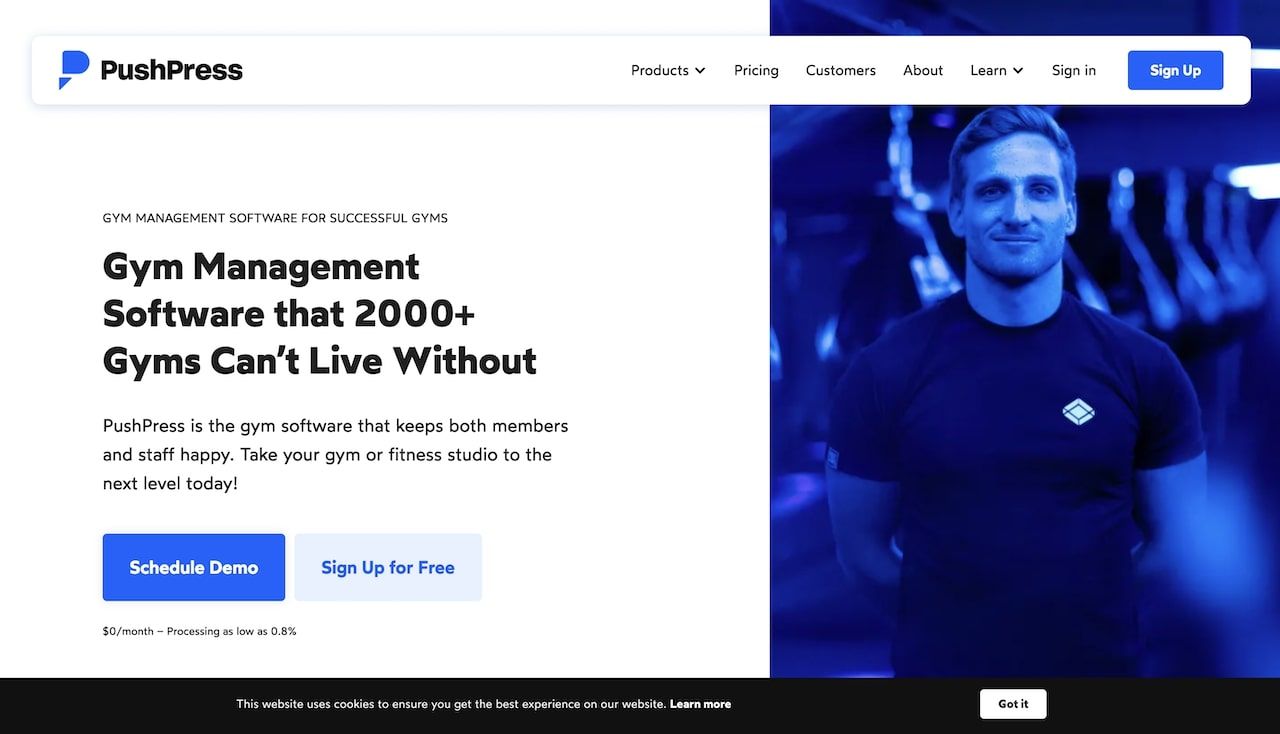
Source: PushPress
5. PushPress
PushPress positions itself as a gym management software solution, aiming to cater to the needs of smaller to larger gyms and fitness studios. It boasts of providing ease of use for both members and staff, coupled with strong customer support.
Features and functionality - A mixed experience: PushPress users have reported high satisfaction with the software's customer support, which is described as quick, helpful, and continuously improving. The software is praised for its intuitive and clean interface, making it easy for staff to learn and use. [9]
However, there are some drawbacks. Users have noted that the app can run slow on tablets and encounter issues.
Additionally, there's a desire for more detailed customization options, particularly for event times and cancellation windows, suggesting that while the software is user-friendly, it may not meet all the specific needs of a fitness business.
Pricing - A range of options with additional costs for integrations:
While PushPress provides different pricing tiers to cater to businesses of various sizes, there might not be a perfect fit for every gym or studio. This lack of a one-size-fits-all pricing model can be challenging for businesses that fall in between the defined tiers.
They may need to choose a plan that doesn't align perfectly with their needs, potentially overpaying for features they don't use or missing out on essential functionality.
PushPress also offers add-ons integrations with various third-party apps and services, but some of these integrations may come at an extra cost. This means that businesses looking to connect PushPress with other tools they rely on may incur additional expenses beyond the base subscription fee. These extra costs can add up and potentially strain a business's budget.
Pros:
- Can be integrated with popular tools like Slack, Facebook, Google Calendar, Mailchimp, and Zapier.
- Offer a free plan with unlimited leads and 100 members cap.
- User-friendly and simple interface.
Cons:
- Not all features are available immediately; instead, you may need to purchase add-ons to access certain features.
- The free plan does not include integration with external tools.
Notable features:
- Workout Tracking: Allow trainers to create a personalised workout plan for members using the member app and monitor their progress in real-time.
- Lead Generation System: Track and follow up with leads automatically with features like lead tracking, which enables you to view a complete list of your leads and their entire communication history. Additionally, the feature offers automated follow-up functionality to send text messages, make phone calls, and send emails to leads.
Free Trial:
No free trial since its already have free plan.
Pricing:
PushPress has 2 different plans:
- Pro: 159 USD per month
- Max: 229 USD per month
Add-ons:
- Branded member app: 97 USD per month
- PushPress Grow: not specified.
6. Momence
As we continue to explore alternatives to Mindbody, Momence emerges as a contender, especially noted for its user-friendly sign-up process and its appeal to those who find other platforms like Mindbody overly complex and costly. However, while Momence presents some advantages, there are aspects that potential users need to consider.
User experience and onboarding: Users report that Momence offers an easy initial sign-up process, which is a plus for studios wanting to minimise friction for new clients.
However, some users have highlighted challenges during the onboarding process, noting a need for more training to fully understand and utilise the software's capabilities. This could pose a problem for businesses that lack the time or resources for extensive training.
Many switch to Momence from other platforms like Mindbody, citing its simplicity and lower cost as significant factors. However, it's worth noting that some of these switches were due to frustrations with previous software's lack of user-friendliness and inadequate customer support, rather than a standout feature of Momence itself
Customer support and feedback: While Momence is praised for its proactive customer support and its openness to user feedback, some users feel that ongoing training and support could be enhanced.
The company does make efforts to update and add new features regularly, which is a positive sign of its commitment to improvement.
Feature set and adaptability: Momence offers a forward-thinking feature set and is responsive to feedback for future updates. However, users have expressed a desire for more integrative capabilities, such as calendar integrations and better scheduling options for recurring classes.
The need for workarounds for specific requirements suggests that while Momence is adaptable, it may not yet meet all the specialised needs of more complex fitness operations without some manual effort.
Marketing and automation: One of the more notable offerings of Momence is its automated marketing capabilities. The platform allows for the automation of email and SMS campaigns, employing strategies like win-back campaigns and targeted retargeting to potentially increase customer retention and engagement.
Pricing and fees: Momence’s pricing structure includes several tiers, ranging from a free plan with basic access and a 5% transaction fee to more premium options that reduce or eliminate transaction fees . The processing fees for online card payments are relatively high at 3.9% + $0.30, which might be a consideration for businesses with high transaction volumes
Momence presents itself as a user-friendly and responsive platform, ideal for those who prioritise ease of use and supportive customer service. However, the need for extensive training and the presence of certain limitations in its feature set might make it less appealing for businesses looking for a comprehensive, all-in-one solution.
Pros:
- Offers extensive templates and custom campaign options.
- Known for responsive and helpful support via video chat.
- Simple interface that is easy to navigate for staff and clients.
Cons:
- There is room for improvement in how Momence provides educational resources about its features. Users have expressed a need for more detailed explanations and business use cases
- Some users have faced significant issues with data migration, reporting that the process was not only cumbersome but also lacked thoroughness and care, impacting their business
- Despite some positive feedback, other users have encountered major difficulties with customer support, particularly when resolving technical glitches and other serious system issues
Notable Features:
- Marketing Suite: Offers a comprehensive set of tools for creating and managing marketing campaigns.
- Video Chat Support: Provides real-time support through video chats, enhancing the quality of customer service.
- Intuitive App Interface: Ensures that even users with limited tech skills can easily navigate and use the software.
Free Trial:
Momence offers a free trial period, allowing users to explore its features before making a financial commitment.
Pricing:
Access to pricing information isn't immediately available on their website.
7. Acuity Scheduling
Acuity Scheduling is a cloud-based appointment scheduling software that is now part of Squarespace. Acuity is tailored to meet the needs of both small and midsize businesses as well as individual professionals.
Scheduling made simple: Acuity is praised for making scheduling straightforward by providing a real-time view of available times, syncing with different time zones, and sending reminders for appointments.
The software includes features like customizable intake forms, embeddable calendars, and group scheduling for workshops. User reviews highlight the ease of integrating appointments into Google Calendar and the simplicity in scheduling clients, which helps with managing weekly appointments.
However, not without flaws: Despite its simplicity, some users have encountered significant frustrations. Issues such as blocked off times still being available for booking and some functions being unintuitively placed have been noted, which can be particularly challenging for small businesses or solo practitioners.
Pricing Considerations: Acuity offers a 7-day free trial, after which prices range from $16 per month for the Emerging Entrepreneur plan to $50 per month for the Powerhouse Player plan. This tiered pricing structure caters to different levels of business needs, from individuals to larger organisations.
User Feedback: The general user sentiment is positive, particularly for its ease of use and functionality. However, the complaints about scheduling conflicts and the organisation of features suggest that while Acuity is powerful, it may not be the best fit for those who need a more robust and intuitive scheduling experience.
While Acuity Scheduling provides a straightforward and generally effective solution for scheduling and managing appointments, its limitations, particularly in handling blocked appointments and the placement of some functionalities, could pose challenges for smaller businesses or those who prefer more intuitive management tools.
Compared to Rezerv, which offers a comprehensive set of features tailored for various business sizes with robust customer support, Acuity might seem less accommodating for those needing more detailed and flexible control over their scheduling needs.
Pros:
- Offers a real-time view of available times which makes booking straightforward and efficient.
- The software seamlessly integrates with external calendars like Google Calendar, enhancing its utility for managing appointments.
Cons:
- Users have reported issues like blocked times still being available for booking, which can lead to double bookings and scheduling conflicts.
- Some functionalities are reported to be unintuitively placed within the interface, posing challenges especially for small businesses and solo practitioners.
Notable Features:
- Group Scheduling: Acuity supports the scheduling of workshops and multiple participants, which is great for businesses that offer classes.
- Customizable Intake Forms: Allows businesses to gather necessary information from clients during the booking process, tailored specifically to their needs.
Free Trial:
Acuity offers a 7-day free trial.
Pricing:
- Emerging Entrepreneur: $16 per month.
- Growing Business: $25 per month.
- Powerhouse Player: $50 per month.
Conclusion
Choosing the right fitness studio management software requires careful consideration of your specific needs. Each alternative to Mindbody, offers unique strengths but also comes with its own set of challenges. When selecting a platform, consider its compatibility with your business operations, budget, and growth objectives.
It's important to weigh the pros and cons, such as customer service quality and pricing transparency. Utilising free trials or demos where available can provide deeper insights and help gauge the software's fit with your studio.
Ultimately, the ideal software should not only meet your operational needs but also support your business's growth efficiently. Make sure to thoroughly test and gather user feedback to ensure the software you choose aligns well with your studio’s goals and culture.
Friska 🐨
Read next: Top 5 ZingFit alternatives & competitors
FAQs
1. What is Mindbody?
Mindbody is a comprehensive cloud-based management software designed for the wellness services industry. It helps businesses manage their scheduling, point of sale, membership, marketing, and more, streamlining operations and enhancing customer engagement.
2. How much does Mindbody cost?
Mindbody's pricing varies depending on the level of functionality required. The basic plans start around $129 per month.
3. How much is Mindbody per month/how much does Mindbody cost per month?
Mindbody offers several pricing tiers, starting at $129 per month for the basic plan. More advanced features and higher tiers increase the monthly cost, reaching up to $599 per month for the most comprehensive package.
4. Who owns Mindbody?
Mindbody is a publicly traded company on the NASDAQ under the symbol MB. It was founded by Rick Stollmeyer and Bob Murphy.
5. How to delete a Mindbody account?
To delete your Mindbody account, you typically need to contact customer service or access your account settings where you may find an option to deactivate or delete your account. Specific steps can vary based on the studio or business's settings in Mindbody.
6. How to cancel a Mindbody subscription or membership?
To cancel your Mindbody subscription or membership, log into your account, navigate to your subscription settings, and follow the prompts to cancel. If you encounter difficulties, contacting the service provider directly or Mindbody customer support is advisable.
7. How to extend a membership freeze in Mindbody?
Extending a membership freeze in Mindbody can usually be done by accessing your account settings or directly contacting the fitness studio or service provider to request an extension.
8. How does Mindbody work?
Mindbody software integrates various business functions into a single platform, including scheduling classes, managing memberships, processing payments, and conducting marketing campaigns. This integration helps businesses optimise their operations and provide better service to their clients.
.jpg.crdownload (1).jpg)
